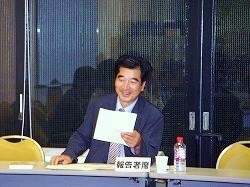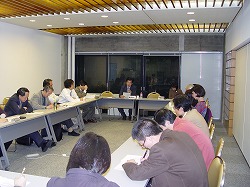2008 Lecture Series,Number One
“The Unique and Peripheral Nature of Japanese Society and Culture”
Professor ITO Abito (University of the Ryukyus)
・Data April 28, 2008, 18:30-20:30
・Place Ichigaya Campus, Hosei University


“What is the Uniqueness of Japanese Society?”
The first lecture in the 2008 Lecture Series on East Asian Cultural Studies was given by Professor ITO Abito, author of the recent book Bunka jinrui-gaku de yomu Nihon no minzoku
shakai (Japanese folk society: A perspective from cultural anthropology).
The theme of the lecture, based on his book, was“Understanding the unique and peripheral nature of Japanese society.” The idea put forward was that, despite Japan being geographically situated in the East Asian Civilization block, it only shares fragments of the regional tradition of a logical and systematic approach to understanding Man and the world. For example, in Japan Buddhism has been indigenized and syncretized with Shintoism, and for a long time the influence of Confucianism was limited to samurai society and only partially expanded to the masses after the Meiji era. Instead, Japanese understanding of Man and the world has been about sensibility to nature.
In bushido( Japanese chivalry), kagaku (poetry), kokugaku (nativism) and folk culture, the main objective has been the pursuit of mono no aware (aesthetic sense or sensibility).
The reclusive character of the island country was identified as the reason for this. It lacked self-awareness of being at the periphery of Asia and was not conscious of the closed nature of its cultural achievements. Hence, as members of the elite class from the late Edo period adopted Western values to rule the country, the peripheral nature of Japan in the global context did not interfere with their adaptation, which was made directly and without hesitation. At the same time, the opening up of the country led to the strengthening of traditional Japanese culture and values. The two created a dilemma that takes the form of Wakon Yo sai (Japanese spirit with Western learning).
The Professor ITO concluded that the dilemma experienced by Japan over its peripheral nature is not unique but, under similar conditions, is a phenomenon that occurs universally in the process of modernization.


